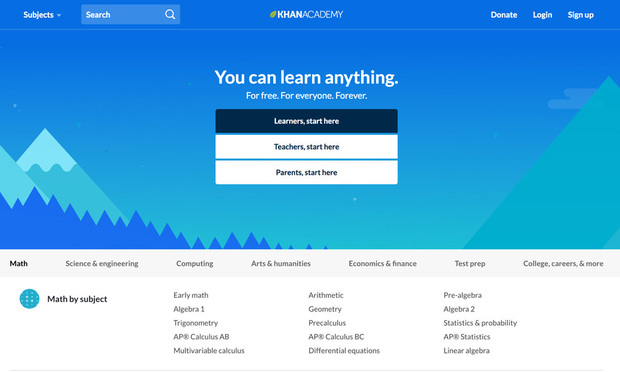Khan Academy's Free LSAT Prep Program Draws Jeers, Cheers
The highly anticipated program, created in conjunction with the organization that makes the law school entrance exam, is set to go live June 1.
May 24, 2018 at 02:06 PM
6 minute read
 Screenshot of Khan Academy website at https://www.khanacademy.org.
Screenshot of Khan Academy website at https://www.khanacademy.org.
A major player in free online education is poised to release its Law School Admission Test prep program, but the traditional LSAT prep industry says it isn't sweating the new competition. At least not yet.
Existing LSAT prep providers say they don't expect Khan Academy's free program—a partnership with the Law School Admission Council, which makes the LSAT—to drain away their clientele and upend the LSAT prep industry. Khan Academy's program, which goes live June 1, provides users with LSAT questions and explanations.
The council announced its collaboration with Khan Academy in March 2017, citing a desire to help aspiring law students for whom private test prep is financially out of reach. Private LSAT prep services cost anywhere from $200 or more for instructional videos to $1,500 and upward for in-person classes.
Several traditional test prep providers who have viewed a beta version of the program or spoken with early users, however, said the new program doesn't offer the depth of instruction that they do. They expect the Khan Academy program to be a place where LSAT takers get their feet wet, and it will likely function as a supplement to existing LSAT prep programs.
“There is no doubt that when this was announced, everybody was like, 'Well, this could be a really big deal,'” said Dave Killoran, chief executive officer of PowerScore Inc., which offers LSAT test prep as well as law school admissions counseling. “I'd say that within the industry, there was a healthy amount of concern. Now that we've seen what it is, that concern has largely disappeared.”
But Law School Admission Council president Kellye Testy said that traditional test prep providers have a financial interest in downplaying the benefits of the free Khan Academy program, and that they may not have seen its full capabilities because the program is still in the beta testing phase.
“The design is absolutely thorough enough that it could be someone's only tool,” Testy said. “There's no question about that. But we also recognize that people learn in different ways. We're not trying to say that someone should only use this. We just wanted to make sure that we had presented to the marketplace a free excellent tool to help even that playing field.”
The free program comes at a time when the LSAT's monopoly on law school admissions is weakening. Nineteen law school currently or soon will allow applicants to submit GRE scores alongside LSAT scores, and more schools are expected to join that list should the American Bar Association eliminate its long-standing requirement that schools use the LSAT. A proposal to that effect is scheduled for a final vote in August. The council last year increased the number of LSAT test dates from four to six, and Testy said it's looking for more ways to make the exam accessible to aspiring lawyers.
“I don't believe [the Khan Academy program] will be a game changer, but I do believe that there is something good in it,” said LSAT coach Steve Schwartz, noting that many free LSAT prep materials are already available online. “Some students will benefit to some degree, and I'm glad it's out there.”
Salman Khan founded the nonprofit Khan Academy in 2006 after tutoring a cousin over the internet, and the enterprise has since expanded to 150 employees and offers free online instruction in a wide variety of subjects for students from kindergarten through high school.
Khan Academy launched a similar partnership with the College Board in 2015 to provide free online SAT tutoring. A study two years later concluded that users increased their SAT scores an average 115 points, though the study did not compare that figure to gain achieved by takers with private prep. Khan Academy also offers some resources for those taking the MCAT and the GMAT.
A beta version of the LSAT program launched in late April, and approximately 5,000 people who signed up to take the June 11 LSAT have used it. Testy said early feedback has been positive.
“I've heard that people are surprised at how clear the instruction is about the steps of thinking through how you do analysis, or inductive or deductive reasoning,” she said. “I think people are pretty happy.”
Khan said in an interview that in addition to being free, his program differs from existing LSAT prep offerings because it's personalized, through diagnostic testing, to each user's strength and weaknesses. Additionally, the program allows users to practice on real LSAT exams and with practice questions that were vetted by the actual makers of the test.
“We view it more as learning the skills versus just trying to game a few things and cram before the test,” Khan said. “We want to be the best, but it just also happens to be free so we can level the playing field.”
Jeff Thomas, executive director of prelaw programs at Kaplan Test Prep, said he expects the majority of LSAT registrants to at least check out the Khan Academy program. However, he predicted most will also use other LSAT resources or classes.
“I don't think students can reach their full potential by using it,” he said. “Bottom line, this should not wholly disrupt LSAT test preparation as we know it.”
Law school admissions consultant Mike Spivey agreed.
“Appreciably, over 100,000 people take the LSAT every year—that's 100,000 idiosyncratic study methods,” Spivey said. “There will never be a 'one size fits all' study method for standardized tests, just as there isn't for admissions decision-making. The beta test feedback I've seen would suggest that people are using both the Khan platform as well as other methods, which has always been a common paradigm for studying.”
Several private test prep providers also said that the council's involvement in the program creates something of a conflict of interest given that it wants the LSAT to accurately predict a taker's first-year law school grades. That's not the same thing as wanting a taker to merely score as highly as possible, they said.
“On the one hand, they're providing the test,” Killoran said. “On the other hand, they're supposed to be the code breakers for the test? That's not going to work. We feared that they wouldn't really hand over the keys to the kingdom, and it turned out, that's precisely what occurred.”
Testy said that there are no insider secrets to performing well on the LSAT beyond mastering the reasoning skills students will need in law school and in the legal profession. Focusing on test strategies at the expense of true learning does future lawyers no favors, she said.
“I don't see it as a conflict of interest,” Testy said. “We want users to learn what they're going to need to know for law school and we want to test to match that.”
This content has been archived. It is available through our partners, LexisNexis® and Bloomberg Law.
To view this content, please continue to their sites.
Not a Lexis Subscriber?
Subscribe Now
Not a Bloomberg Law Subscriber?
Subscribe Now
NOT FOR REPRINT
© 2025 ALM Global, LLC, All Rights Reserved. Request academic re-use from www.copyright.com. All other uses, submit a request to [email protected]. For more information visit Asset & Logo Licensing.
You Might Like
View All
'Everything From A to Z': University GCs Tested by Legal, Financial, Societal Challenges
6 minute read
'Basic Arithmetic': Court Rules in Favor of LA Charter School Denied Funding by California Education Department

Uvalde Shooting 'Fresh in Everyone's Mind:' Lone Dissenting Judge Disagrees with School's Disciplinary Decision Over Pellet Gun

From 'Confusing Labyrinth' to Speeding 'Roller Coaster': Uncertainty Reigns in Title IX as Litigators Await Second Trump Admin
6 minute readTrending Stories
Who Got The Work
J. Brugh Lower of Gibbons has entered an appearance for industrial equipment supplier Devco Corporation in a pending trademark infringement lawsuit. The suit, accusing the defendant of selling knock-off Graco products, was filed Dec. 18 in New Jersey District Court by Rivkin Radler on behalf of Graco Inc. and Graco Minnesota. The case, assigned to U.S. District Judge Zahid N. Quraishi, is 3:24-cv-11294, Graco Inc. et al v. Devco Corporation.
Who Got The Work
Rebecca Maller-Stein and Kent A. Yalowitz of Arnold & Porter Kaye Scholer have entered their appearances for Hanaco Venture Capital and its executives, Lior Prosor and David Frankel, in a pending securities lawsuit. The action, filed on Dec. 24 in New York Southern District Court by Zell, Aron & Co. on behalf of Goldeneye Advisors, accuses the defendants of negligently and fraudulently managing the plaintiff's $1 million investment. The case, assigned to U.S. District Judge Vernon S. Broderick, is 1:24-cv-09918, Goldeneye Advisors, LLC v. Hanaco Venture Capital, Ltd. et al.
Who Got The Work
Attorneys from A&O Shearman has stepped in as defense counsel for Toronto-Dominion Bank and other defendants in a pending securities class action. The suit, filed Dec. 11 in New York Southern District Court by Bleichmar Fonti & Auld, accuses the defendants of concealing the bank's 'pervasive' deficiencies in regards to its compliance with the Bank Secrecy Act and the quality of its anti-money laundering controls. The case, assigned to U.S. District Judge Arun Subramanian, is 1:24-cv-09445, Gonzalez v. The Toronto-Dominion Bank et al.
Who Got The Work
Crown Castle International, a Pennsylvania company providing shared communications infrastructure, has turned to Luke D. Wolf of Gordon Rees Scully Mansukhani to fend off a pending breach-of-contract lawsuit. The court action, filed Nov. 25 in Michigan Eastern District Court by Hooper Hathaway PC on behalf of The Town Residences LLC, accuses Crown Castle of failing to transfer approximately $30,000 in utility payments from T-Mobile in breach of a roof-top lease and assignment agreement. The case, assigned to U.S. District Judge Susan K. Declercq, is 2:24-cv-13131, The Town Residences LLC v. T-Mobile US, Inc. et al.
Who Got The Work
Wilfred P. Coronato and Daniel M. Schwartz of McCarter & English have stepped in as defense counsel to Electrolux Home Products Inc. in a pending product liability lawsuit. The court action, filed Nov. 26 in New York Eastern District Court by Poulos Lopiccolo PC and Nagel Rice LLP on behalf of David Stern, alleges that the defendant's refrigerators’ drawers and shelving repeatedly break and fall apart within months after purchase. The case, assigned to U.S. District Judge Joan M. Azrack, is 2:24-cv-08204, Stern v. Electrolux Home Products, Inc.
Featured Firms
Law Offices of Gary Martin Hays & Associates, P.C.
(470) 294-1674
Law Offices of Mark E. Salomone
(857) 444-6468
Smith & Hassler
(713) 739-1250








